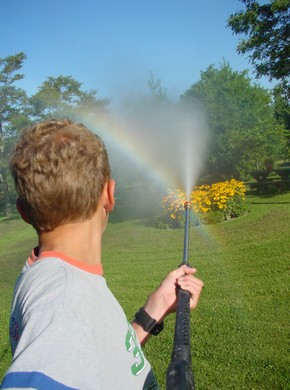 Besides the fact that pressure washers make it easier to stay on top of outdoor cleaning chores, a good one is just plain fun to use. There’s something addictive about launching a plume of 2,000 psi water with the flick of a finger, a fact that isn’t lost on the dozens of manufacturers now marketing pressure washers of all kinds to homeowners. There are some terrific machines out there nowadays, but to buy well, you need a little technical background.
Besides the fact that pressure washers make it easier to stay on top of outdoor cleaning chores, a good one is just plain fun to use. There’s something addictive about launching a plume of 2,000 psi water with the flick of a finger, a fact that isn’t lost on the dozens of manufacturers now marketing pressure washers of all kinds to homeowners. There are some terrific machines out there nowadays, but to buy well, you need a little technical background.
Pressure Washers – Technical Background
- Pressure washers are electric or gas-powered devices that take tap water at a pressure of 30 to 90 pounds per square inch (psi) and boost it to 1400 to 2400 psi delivered at the end of a hand-held spray wand.
- This huge increase in pressure turns the flow of water into a potent cleaning agent.
- The most powerful models can even strip old finishes from decks.
The question is whether or not the $250 to $800 price tag makes sense for you. There’s also the hassle of storing, setting up and putting away the machine between uses. As I’ve discovered, the question of pressure washer ownership really boils down to the value of your time and the expectations you have for your property.
Over the last couple of years I’ve been testing a range of pressure washers with the aim of answering this question for you. Pressure washers are more than a gimmick, but they’re also not for everyone, despite what ad campaigns would lead you to believe.
The Machines can be Roughly Divided into Two Categories:
- Electric – Electric models typically top-out delivering about 1 1/2 gallons of water per minute at 1500 psi.
- Gas-powered – Consumer-grade gas-powered models go as high as 2400 psi at 2.4 gallons per minute in my test group.
Intended Usage
If you have a wooden deck or large areas of wood siding on your house, then you’ll not only save lots of time with a pressure washer tool, but you’ll also appreciate the extra oomph of a gas model. There’s a surprising difference between the effect of a 1500 psi spray stream and a 2400 psi blast.
- Electric models are fine for medium-duty cleaning jobs like hosing down the boat or car.
- Gas machines are more flexible because they can also strip off loose wood finishes and clean siding. The smaller gas washers in the 4 to 5 hp range are surprisingly light in weight these days, too.
Consider Accessories
All appliance models come with at least a basic spray wand, but other accessories are worth considering. In my tests, two stood out:
- Water-powered rotating brush.
- Spray wand that imparts a dirt-pummeling vibration to the water stream.
Pressure Washer Drawbacks
There are drawbacks to pressure washers that you won’t discover until you own one…
- First, all manufacturers I’ve seen warn that these machines must be put in storage, away from freezing temperatures, during winter. Residual water could remain in the pump, leading to damage as it freezes and expands. Wrestling a pressure washer outside each year and back again can be quite a chore.
- Another challenge has to do with washing your car or boat. Pressure washer advertisements often show a smiling auto owner maintaining his pride and joy with a powerful white spray. And while a pressure washer certainly does blast dirt away from a vehicle better than an ordinary garden hose, it doesn’t completely eliminate the need for elbow grease and a sponge. Without rubbing, I’ve found that residual dirt remains, appearing as a white haze after the water dries.
Perhaps the safest way to answer the pressure washer question for yourself is to rent one and try it. They’re available everywhere. But be warned, pressure washers are very fun, especially a big, burly gasoline model. It’s a power thing. Hit the trigger on the wand and watch a massive blur of white spray shoot out, pushing the wand back into your hands with fire hose recoil. It’s a real blast, literally.